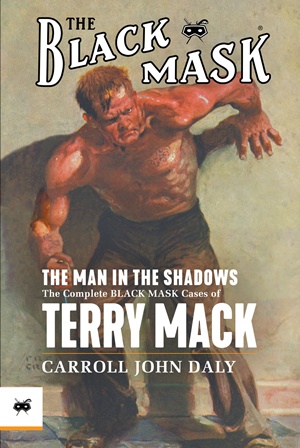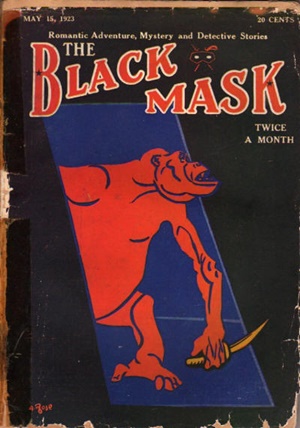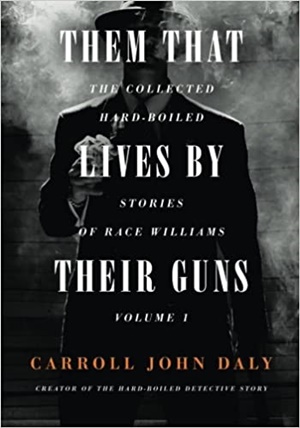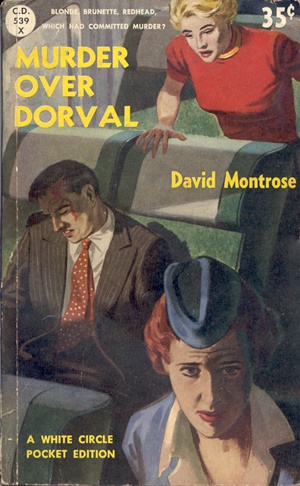A (Black) Gat in the Hand: Carroll John Daly & the Birth of Hardboiled Pulp
 You’re the second guy I’ve met within hours who seems to think a gat in the hand means a world by the tail.” – Phillip Marlowe in Raymond Chandler’s The Big Sleep
You’re the second guy I’ve met within hours who seems to think a gat in the hand means a world by the tail.” – Phillip Marlowe in Raymond Chandler’s The Big Sleep
(Gat — Prohibition Era term for a gun. Shortened version of Gatling Gun)
Quiz time: Who invented the hard-boiled school of fiction? And who was the first hard-boiled private eye? Hint – Dashiell Hammett is not part of the answer. Another Hint – if you answered Carroll John Daly and Race Williams, not bad, but you’d only be half right.
In December of 1922, Daly’s “The False Burton Combs” appeared in Black Mask Magazine, and the hard-boiled school was born. Combs is not a private eye, so that’s not the answer. He is ‘a gentleman adventurer’ (though not of the Victorian Era kind) who agrees to take on someone’s identity and then proceeds to ooze toughness all over Nantucket. He is a completely one-dimensional character and it’s B-grade pulp. But it’s the first of its kind.
In April of 1923, “It’s All in the Game” (which I’ve yet to read), with an unnamed protagonist, was printed. And on May 15, 1923, “Three Gun Terry” gave us Three Gun Terry Mack, first of the unnumbered hardboiled private eyes to follow for almost a century.
In June, 1923, the first Race Williams story, “Knights of the Open Palm,” appeared in Black Mask and it is this story which many folks erroneously point to as the first one to feature a hard boiled private eye. In case you’re wondering, Dashiell Hammett’s Continental Op made his debut in “Arson Plus” in October of that year. Yes, Hammett was better. But simply, he wasn’t first.
Mack only appeared in one more short story, (“Action! Action!” – Black Mask, January, 1924) and also in one novel (The Man in the Shadows, 1928). Mack was clearly a prototype for Race Williams, who would appear in some forty-ish stories and six serials/novels for Black Mask, and again as many in other publications.
The tone is set from the first sentence from Mack:
“My life is my own, and the opinions of others don’t interest me, so don’t form any, or if you do, keep them to yourself. If you want to sneer at my tactics, why go ahead; but do it behind the pages – you’ll find that healthier.”
And in the second paragraph, it’s more of the same:
“Sometimes they (crooks) gun for me, but that ain’t a one-sided affair. When it comes to shooting, I don’t have to waste time cleaning my gun. A little windy, that; but you get my game.”
It’s like that through the entire story. Get the point?
“Sure, I said. You don’t take me for no Sir Lunchlot, do you? This is business with me. And to keep him from having a stroke of apoplexy, I tell him my trade.”
Cruising the streets, looking to drum up some business, Mack foils a kidnapping. He’s hired by the girl’s uncle to find a missing secret formula (isn’t every formula secret, in fiction?). The formula suddenly reappears, Mack is paid off and we’re done. Except, of course, he doesn’t just go away, there’s more going on and we finish with the expected gun play. It’s actually not a bad story.
But it’s just too hard to get past the heavy handed writing. “But he never finished that string of dirty epithets. I up with the butt of my gun and gave him a swipe across the face that made his lordly air look mighty cheap. And right here come the tactics that you may not agree with. You may question the ethics, but the results are good. Poor morals perhaps, but good, sound, common sense.”
Regarding Mack and Williams, what Daly did was turn the classic pulp western into an urban story. Hammett would bring a realism to the new genre and Chandler would paint word pictures of the ‘errant knight.’

But Daly was taking the shoot ‘em up action of the Wild West and transplanting it to the city streets. And this was in direct contrast to the locked room and country cozy stories coming out England as part of The Golden Age. It reflected a Prohibition Era America.
So, while the man absolutely was not a stylist, he was writing fast-paced, action-packed stories of urban violence (no sex: Daly’s heroes were celibate). And he was tremendously successful at it.
Raymond Chandler famously said, “When in doubt, have a man come through a door with a gun in his hand.” Daly’s axiom could be stated as, “Start with guys shooting and don’t stop until you type ‘The End.’”
In 1930, Black Mask readers voted on their favorite authors. Hammett finished a distant third, behind runner-up Erle Stanley Gardner, whose Ed Jenkins (The Phantom Crook) appeared in over seventy stories. Daly was far and away the most popular, and it’s said that his name on the cover was good for a fifteen percent increase in sales. Daly was the most popular Black Mask writer throughout the twenties.
Regarding Williams, it was really a fluke that he even made it into Black Mask. Editor George Sutton was on vacation and associate editor Harry North took the first two Williams stories, pushing Daly to finish and submit the second one before Sutton got back. Sutton returned and after the Williams stories had been printed, he called Daly in and told him how bad he thought those stories were.
According to Daly, Sutton said, “I don’t like these stories – but the readers do…Write them. I don’t like them. But I’ll buy them and I’ll print them…Everyone seems to like him but me.” Now THAT is damning with faint praise!
At the end of 1934, Daly and legendary Black Mask editor Joe Shaw (who never liked Daly’s writing) had a disagreement and Daly took his typewriter to the competing Dime Detective, which paid a higher per word rate. He wrote a few more stories for the Mask after Shaw was fired, but Daly was essentially done at Black Mask.
The form evolved during the thirties, and into the forties. Daly’s style of hardboiled was replaced by writings from the likes of Cornell Woolrich, Wyatt Blasingame, and Robert Reeves. Daly rapidly fell out of favor in the forties and struggled to sell stories until his death in 1958. It must have galled him that his fellow Black Masker, Erle Stanley Gardner became the world’s best-selling author, thanks to the Perry Mason novels.
It is somewhat ironic that at the same time Daly was being shut out of the field he created, Mickey Spillane was selling millions of copies of his Mike Hammer books. Spillane said in a fan letter to Daly, “Yours was the first and only style of writing that ever influenced me in any way. Race was the model for Mike” (Hammer).
It’s no surprise the success of the Hammer books bothered Daly: “I’m broke and this guy gets rich writing about my detective.” But what Daly misses here is that Spillane mixed raw sexuality with violence in the Hammer books. It makes them a very different read than the Williams stories they otherwise emulate. Put Williams and The Flame in a torrid relationship and you’d have something a lot more like a Mike Hammer tale.
Fans like to speculate that Nero Wolfe is the offspring of Sherlock Holmes and Irene Adler (though Mycroft seems a more likely father figure). In that vein, Mike Hammer could well be the love child of Race Williams and The Flame.
Personally, neither Williams nor Hammer are high on my favorites list. I much prefer a similar detective, Hugh B. Cave’s hard drinking PI, Peter Kane.
 I re-read a couple of the Williams’ novels that appeared in Dime Detective shortly after Daly left Black Mask. They are clearly better written than “Three Gun Terry,” but they are still obviously Daly.
I re-read a couple of the Williams’ novels that appeared in Dime Detective shortly after Daly left Black Mask. They are clearly better written than “Three Gun Terry,” but they are still obviously Daly.
Daly seems to be treated as a grudging footnote in the history of the hard-boiled school. Commentators feel that he must be addressed because of his spot as the originator. I’m not aware of any dedicated biography of Daly, and until recently (more on that below) most of his work was out of print.
I pick up a Daly story, accepting it for what it is. And knowing I’ll need to gloss over the shortcomings. But within those constraints, I’ll get a non-stop, guns blasting hardboiled tale. And sometimes, that’s good enough.
Daly himself was nothing like his characters, rarely leaving the confines of his house. He had no experience with crime, private eyes or the law. However, since Race Williams always wore a pair of .45 automatics, Daly purchased one. He was arrested for carrying a concealed weapon as he took it home. That was the end of his criminal research.
Steeger Books (formerly Altus Press) has made a trove of Daly’s work available, in print and as ebooks. There are six over-sized Race Williams collections in paperback, and many short stories in electronic format. A print collection with the three Terry Mack stories should be available soon.
Daly opened up a door that many followed him through. And while he was out in front for a while, he ended up in the back, mostly invisible. Mickey Spillane was a disciple and he sold millions of books.
Mack, Williams, Stan Hall, Vee Brown: While I do think that Daly improved a bit over the years, ‘polish’ is not something to be found in his his hardboiled pulp stories. And his trailblazing characters don’t have the same luster as those from his contemporaries. But there is no denying it was Carroll John Daly that started the whole thing going.
This post originally appeared on Black Gate in 2015 and is really the roots of A (Black) Gat in the Hand. I wanted to revise it a bit, and get it into the series it helped establish.
Prior posts in A (Black) Gat in the Hand – 2021 Series (4)
Norbert Davis
Appaloosa
A (Black) Gat in the Hand is Back!
Black Mask – March, 1932
Prior posts in A (Black) Gat in the Hand – 2020 Series (19)
Hardboiled May on TCM
Some Hardboiled streaming options
Johnny O’Clock (Dick Powell)
Hardboiled June on TCM
Bullets or Ballots (Humphrey Bogart)
Phililp Marlowe – Private Eye (Powers Boothe)
Cool and Lam
All Through the Night (Bogart)
Dick Powell as Yours Truly, Johnny Dollar
Hardboiled July on TCM
YTJD – The Emily Braddock Matter (John Lund)
Richard Diamond – The Betty Moran Case (Dick Powell)
Bold Venture (Bogart & Bacall)
Hardboiled August on TCM
Norbert Davis – ‘Have one on the House’
with Steven H Silver: C.M. Kornbluth’s Pulp
Norbert Davis – ‘Don’t You Cry for Me’
Talking About Philip Marlowe
Steven H Silver Asks you to Name This Movie
Cajun Hardboiled – Dave Robicheaux
More Cool & Lam from Hard Case Crime
A (Black) Gat in the Hand – 2019 Series (15)
Back Deck Pulp Returns
A (Black) Gat in the Hand Returns
Will Murray on Doc Savage
Hugh B. Cave’s Peter Kane
Paul Bishop on Lance Spearman
A Man Called Spade
Hard Boiled Holmes
Duane Spurlock on T.T. Flynn
 Andrew Salmon on Montreal Noir
Andrew Salmon on Montreal Noir
Frank Schildiner on The Bad Guys of Pulp
Steve Scott on John D. MacDonald’s ‘Park Falkner’
William Patrick Murray on The Spider
John D. MacDonald & Mickey Spillane
Norbert Davis goes West(ern)
Bill Crider on The Brass Cupcake
A (Black) Gat in the Hand – 2018 Series (32)
George Harmon Coxe
Raoul Whitfield
Some Hard Boiled Anthologies
Frederick Nebel’s Donahue
Thomas Walsh
Black Mask – January, 1935
Norbert Davis’ Ben Shaley
D.L. Champion’s Rex Sackler
Dime Detective – August, 1939
Back Deck Pulp #1
W.T. Ballard’s Bill Lennox
Day Keene
Black Mask – October, 1933
Back Deck Pulp #2
Black Mask – Spring, 2017
‘Max Allen Collins & The Hard Boiled Hero’
A (Black) Gat in the Hand: William Campbell Gault
A (Black) Gat in the Hand: More Cool & Lam From Hard Case Crime
MORE Cool & Lam!!!!
Thomas Parker’s ‘They Shoot Horses, Don’t They?’
Joe Bonadonna’s ‘Hardboiled Film Noir’ (Part One)
Joe Bonadonna’s ‘Hardboiled Film Noir’ (Part Two)
William Patrick Maynard’s ‘The Yellow Peril’
Andrew P Salmon’s ‘Frederick C. Davis’
Rory Gallagher’s ‘Continental Op’
Back Deck Pulp #3
Back Deck Pulp #4
Back Deck Pulp #5
Joe ‘Cap’ Shaw on Writing
Back Deck Pulp #6
The Black Mask Dinner

Bob Byrne’s ‘A (Black) Gat in the Hand’ made it’s Black Gate debut in the summer of 2018 and has returned every one since.
His ‘The Public Life of Sherlock Holmes’ column ran every Monday morning at Black Gate from March, 2014 through March, 2017. And he irregularly posts on Rex Stout’s gargantuan detective in ‘Nero Wolfe’s Brownstone.’ He is a member of the Praed Street Irregulars, founded www.SolarPons.com (the only website dedicated to the ‘Sherlock Holmes of Praed Street’) and blogs about Holmes and other mystery matters at Almost Holmes.
He organized Black Gate’s award-nominated ‘Discovering Robert E. Howard’ series, as well as the award-winning ‘Hither Came Conan’ series.
He has contributed stories to The MX Book of New Sherlock Holmes Stories – Parts III, IV, V, VI and XXI.
He has written introductions for Steeger Books, and appeared in several magazines, including Black Mask, Sherlock Holmes Mystery Magazine, The Strand Magazine, and Sherlock Magazine.
I never made the connection between Mycroft and Nero Wolfe! I feel a bit like Watson after Holmes has explained something to him – ie, it seems very obvious in retrospect.
Re Spillane’s letter to Daly. I’m pretty sure you read the same wiki entry as me, but just in case you didn’t –
‘The story goes (at least as far as Spillane told it) that when Daly’s agent at the time saw the letter, she instituted a plagiarism suit. Whereupon Daly canned her because he hadn’t gotten a fan letter in years and he sure as hell wasn’t about to sue anybody who had actually taken the time to write one.’
Howdy Aonghus! Sherlock is the popular fan theory, of course. But Mycroft’s bulk and lack of inertia certainly make him worth discussing. If it’s Mycroft, then it doesn’t have to be Irene Adler. Could be any female you want to plug in. But we’re staying within the general confines of The Game here.
In a similar vein, I’ve got an unfinished essay from years ago, that looks at all the Sherlock and Mycroft references in John Lescroart’s pseudo-Wolfe novels, Son of Holmes, and The Revenge of Rasputin. It’s fun. So much to write, so little attention span!
I know there are a couple different versions of Daly’s feelings about Spillane, and about the letter. Multiple ones can be true – he certainly could have had different feelings at different times. I do that mere moments apart!
I plan on taking one of the longer Race Williams novellas and doing a more in depth piece. Some day.
I have come to like Daly’s stuff a bit more over the years. And I do think the writing style got a bit better, in the later Race stories. Still, pretty rough.
Well Nero Wolfe would certainly be very similar to Mycroft as he’s presented in ‘The Story of the Greek Interpreter’! That is, fat, indolent but able to solve cases without ever leaving his house.
Speaking of Daly’s shortcomings as a stylist, I’m around halfway through ‘Fast One’, and the prose is as good as anything Hammet ever wrote. So much so, I’m inclined to wonder why Cain isn’t better known. I guess Hammet and Chandler often provided a perspective on the world their character inhabits, whereas Cain’s focus seems to be entirely on pace? (this might also explain the weak ending you mentioned). Still a classic of its kind
Cain was a bit…odd. He only wrote for the pulps for about four years. He had kicked around Hollywood without accomplishing too much. Then he did well in the pulps, and took the better money to write for Hollywood. He died unknown, on the East Coast. He definitely seemed to follow his own path. The fact he produced Fast One in such a short career, is pretty impressive.
[…] “A (Black) Gat in the Hand: Carroll John Daly & the Birth of Hardboiled Pulp.” […]